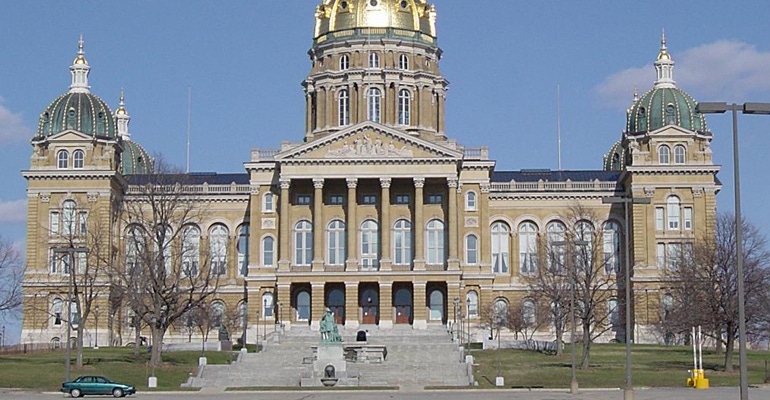
More than 75 members of the Iowa Corn Growers Association filled the State Capitol rotunda on March 29 for the "Iowa Corn Day on the Hill" lobbying event. The delegation included the ICGA board of directors, county leaders and student FFA members from across the state.
"Corn farmers are here in Des Moines today to share our policy priorities with our state legislators," said ICGA President Kurt Hora, who farms near Washington in southeast Iowa. "Our Day on the Hill facilitates the one-on-one interactions where we are able to discuss and promote ICGA priorities. It's the dedication and engagement of our members which allows ICGA to have a strong, unified voice at the State Capitol."
ICGA's "Day of the Hill" efforts focused on three of the organization's top state legislative priorities for the 2017 session, including:
•Taxation. State coupling of the federal Section 179 small-business expensing provision for income tax purposes.
•Conservation. Long-term increased funding for the Iowa Nutrient Reduction Strategy’s water quality protection efforts.
•Ethanol: Obtaining funding for Iowa's biofuels infrastructure cost-share program, the Renewable Fuels Infrastructure Program.
"Our highest priority is full state coupling of the federal Section 179 for small-business expensing,” said Hora. “This allows Iowa farm families to manage their cash flow and reinvest in their businesses which support Iowa's rural economy. A very close second for us is water quality funding. We will continue to work with our state legislators and the governor to support any legislation that will create long-term and consistent water quality initiatives in our state."
To see ICGA's full list of state and federal priorities, visit iowacorn.org/policy. The next step in the policy development process will be ICGA’s annual roundtable meetings in early July and the Grassroots Summit in August. These meetings allow ICGA members to gather and discuss policy direction for the upcoming year.
Will Legislature act on water quality?
What about water quality funding during the current 2017 legislative session? Nothing has been approved yet in the Iowa Legislature, but state lawmakers are considering water quality legislation, notes Hora. Bills similar to last year’s Iowa House of Representatives legislation are now being debated in the House and Senate. Both bills would increase funding for water quality efforts, and have some support among Republicans who this year hold a majority vote in both the House and Senate.
Farmers are investing a lot of their own money, putting cover crops, buffers and other water-quality protection practices to work on their farms, notes Hora. “We’re hoping the Iowa Legislature finds a way to increase the amount of cost-share funding available for these practices. The Iowa Nutrient Reduction Strategy is a voluntary program, and cost-share availability is an incentive to get more farmers to participate.”
A new legislative proposal regarding water quality funding was introduced recently. On March 14, state representative Bobby Kaufmann, R-Wilton, announced he was introducing a bill that would phase in an increase of three-eighths of a cent in the state sales tax to offset cuts in other taxes to make water quality funding revenue-neutral. Kaufmann’s bill, if it becomes law, would eventually pump about $180 million per year into boosting the state’s efforts to protect water quality. Kaufmann describes this proposal as a “good, tax-neutral, water quality funding plan.”
Bill will need to be revenue-neutral
Kaufmann admits there is still some questions about how the bill would affect other state programs. But, he says, the only way the Republican-led Legislature will pass a water-quality funding plan would be if the plan is revenue-neutral. Kaufmann’s bill has been introduced in the Iowa Legislature this session but hasn’t yet moved through any committees. Its future is unclear.
Another water quality bill being debated in the Iowa House is being pushed forward by Rep. Chip Baltimore, R-Boone. It deals with structural issues related to use of water quality funds. “The idea is to better target the water quality money toward watershed programs,” he says.
It’s questionable whether either of these water quality bills will become law this session. But they would provide more money for water quality improvements and would potentially allow officials to better target the use of the funds so that water quality structures are built in locations where needed most and can do the most good protecting water quality.
The key question is how to find a large sum of money to boost the state’s water quality protection efforts, while remaining revenue-neutral in these times when the state budget is tight. “We don’t want to rob Peter to pay Paul,” says Ralph Rosenberg, executive director of the Iowa Environmental Council. “But our state Legislature needs to provide a dependable source of funding to strengthen the water quality protection effort. And there needs to be accountability as to how these taxpayer dollars are spent.”
About the Author(s)
You May Also Like




